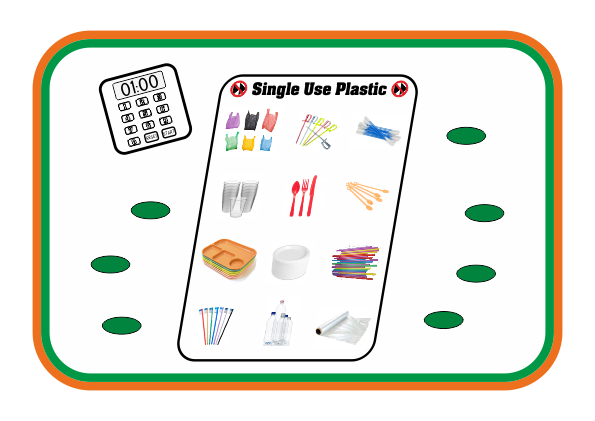
You look at the Blond Hero - really look - and he turns into a gerbil.
Ursla Le Guin (1929-2018)
Myth and Archetype in Science Fiction, 1976
Pair Fluency Match 7 - Single Use Plastic

question
inquiry
mind
Introduction
With Pair Fluency games players ask and answer set questions as fast as possible. With Match 7 there are usually 7 "yes" answers and 5 "No" answers. The aim is to find all the "yes" answers within a time limit.
To play, one player takes a question board and seven counters. The other player takes an answer card. The usual time limit is one minute. This can be shortened for experienced players or lengthened for beginners.
Single Use Plastic
Plastic is one of the great environmental challenges facing humanity. Plastic debris kills more than one million seabirds and 100,000 marine mammals every year. It's predicted that there will be one tonne of plastic for every 3 tonnes of fish by 2025 and more plastic by weight in the sea than fish by 2050
We all need to use less plastic and reuse and recycle more plastic yet in 2016 of the 335 million tonnes of plastic produced around half was for single use plastics. This game lists twelve: plastic bags, plastic cocktail sticks, plastic cotton buds, Plastic cups, plastic cutlery, plastic drink stirrers, plastic food trays, plastic plates, plastic straws, plastic toothbrushes, plastic water bottles and plastic wrapping.
Various questions can be asked. Here's a sample:
Do you reuse [item]?
Do you recycle [item]?
Do you refuse to buy [item]?
Do you refuse to use [item]?
Do you refuse [item] if offered one?
Are you taking action to reduce the number of [item] you use?
Are you talking to friends about not using [item]?
Are you campaigning against [item]?
The player with the card looks at it and responds accordingly. For every "Yes" answer the questioning player covers the matching image on the board with a counter. When the timer goes record the number of points scored and players reverse roles. How many points can the whole class accumulate in 2-4 rounds?
Variation
One player makes sentences based on a card and the other simply listen and places counters on the board. For example, one player could run through all 12 items randomly, "I recycle plastic bags and cocktail sticks but I don't recycle straws." and so on; or to make it easier just list the "yes" items on the card. This method works well for younger players.
Notes:
Players should be somewhat familiar with the vocabulary before doing this game. As a follow-up players can consider real answers for their own actual families.
When doing the game with young players it is best to demonstrate by having a group share one board and take turns asking the teacher questions while the teacher answers from a card. Then reverse roles. The teacher holds the card so the group can see it but the teacher can't. The teacher asks the questions and puts the counters on the board according to the answers the group gives.
getfiles: Match 7: Single Use Plastic!
Game Board - PDF B52 pages, 2.30 MB Game Cards - PDF A4
6 pages, 29.17 MB
- Top Page
- Splog!
- Articles
- Games
- Across The Table
- Add One More
- Anaconda
- Be A Monster!
- Black Hole (board game)
- Bombs Away!
- Catch!
- Catch-Caught-Caught!
- Centipede
- Charades
- Co-operative Quiz
- Crocodile
- Dice Stack
- Fast Food Tag
- Find My Number
- Find The Penny
- Football
- The Happy Game
- Line Up!
- Maze Challenge
- Natty Narration
- Nose Nose Nose
- One Step Forward!
- Pair Fluency Match 7 - Death Wish
- Pair Fluency Match 7 - Go Green!
- Parrot Parade
- Passport Control
- Reach The Top!
- Snake
- SockIt!
- Tickle Time
- What Cards
- Which One?
- Whose Shoe?
- World Cup Football 2018
- You, You, Me!
- Wake Up
- Packs
- Sheets
- Songs and Music
- Strips (songs and otherwise)
- Stories
- Techniques
- Video
- Environment
- Japan
- The 75th Anniversay of the bombing of Hiroshima
- The 75th Anniversay of the bombing of Nagasaki
- Cars in Japan
- Coronavirus Olympics
- Forest Bathing
- Japan and the Summit
- Japan and World War Two
- Multiculural Japan?
- Olympics Two Tokyos
- Plastic in Japan
- Return to Fukushima
- The Anniversary too Important to Cancel
- Typhoon Jebi
- Yayoi Kusama's Infinity
- Other
- This Week In History
- January, February, March
- April, May, June
- Sub Menu Item
- This Week in History: April 8-10
- This Week in History: April 12-15
- This Week in History: April 19-24
- This Week in History: April 24-26
- This Week in History: May 6-11
- This Week in History: May 11-14
- This Week in History: May 18-23
- This Week in History: May 25-31
- This Week in History: June 1-5
- This Week in History: June 11-14
- This Week in History: June 22-27
- This Week in History: June 15-21
- This Week in History: June 29 - July 5
- July, August, September
- This Week in History: July 6-12
- Sub Menu Item
- This Week in History: July 14-19
- This Week in History: July 27-31
- This Week in History: August 2- 6
- This Week in History: August 17-21
- This Week in History: August 27-30
- This Week in History: August 31 - September 6th
- This Week in History: September 7-13
- This Week in History: September 22-27
- This Week in History: September 14-20
- This Week in History: September 28 - October 4
- October, November, December
- Quizes
- Vocab



